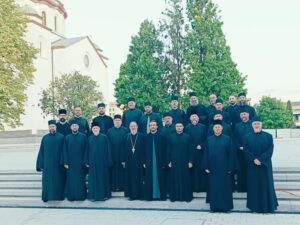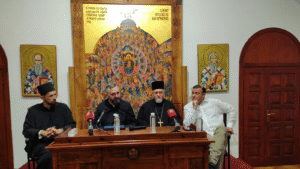The Great Fast is preceded by four preparatory Sundays. During this period, the Lenten Triodion offers a wealth of liturgical texts that spiritually prepare us for the sacred season of Great Lent. The significance of the Lenten Triodion and its hymnographic tradition was previously discussed in the column “From the Editor’s Pen,” and now, we turn our attention to a specific liturgical element.
At Matins on the Sunday of the Prodigal Son, as well as on Meatfare Sunday and Cheesefare Sunday, following the chanting of the Polyeleos Psalms (“Praise the Name of the Lord” and “Give Thanks to the Lord”), Psalm 136 (By the rivers of Babylon…) is sung.
The Unique Authorship of Psalm 136
The authorship of Psalm 136 is unusual. It is attributed to “David through Jeremiah.” Based on this, the Holy Fathers, Saint Athanasius the Great and Blessed Theodore of Cyrus, interpret this dual authorship as follows:
The psalm prophetically foreshadows the destruction of Jerusalem and the Babylonian captivity of the Jewish people. King David, who lived nearly 1,000 years before Christ, composed many psalms, yet the Babylonian exile occurred almost 600 years before Christ, which was 400 years after David’s reign.
The Holy Prophet Jeremiah was a contemporary of the Jewish people who witnessed the destruction of Jerusalem. He repeatedly warned them about the impending ruin of their city due to their unrepented sins. In this way, he interpreted Psalm 136 for both his generation and future generations. Thus, the Church ascribes co-authorship of Psalm 136 to both the Prophet Jeremiah and King David.
A Lament for Jerusalem: The Historical Context
The text of Psalm 136 transports us to the 6th century BC, a time of immense suffering for the Jewish people. The Babylonians invaded the Kingdom of Judah, plundered and destroyed Jerusalem, reducing it to ruins. Even the Temple, the only place on earth where the True God was worshipped, was looted and razed to the ground.
Tens of thousands of Jews, both nobles and commoners, were taken into Babylonian captivity. Their faith wavered, and in losing their faith, they lost their very identity. They suffered from hunger, poverty, and despair.
Long before the Great Fast begins, the Church, like a loving mother, sets before us the sweetness of divine wisdom, of which the Psalmist David says:
“How sweet are Your words to my taste, sweeter than honey to my mouth!” (Psalm 119:103).
Among these spiritual treasures is Psalm 136.
Why does the Church Sing This Psalm Before Great Lent?
The Church presents this historical lament not merely as a lesson from the past, but as a spiritual reality that pertains to our own repentance and transformation.
In antiquity, Babylon was a glorious and powerful city, offering the best of what the ancient world had to offer. Many people saw life in Babylon as a privilege. Yet, from the biblical perspective, we know that the source of Babylon’s power was its rebellion against the True God.
For this reason, Babylon in the Bible symbolizes worldly attachment, materialism, and everything that separates us from God.
Most modern people are, in a sense, living in Babylonian captivity, enslaved by material progress and civilization’s advancements.
But Christ the Saviour has liberated us from this Babylonian exile!
Like the ancient Jews who returned to the ruins of Jerusalem, we too must rebuild our spiritual Jerusalem-our souls and bodies, which have been devastated by sin.
There is a time for weeping and a time for rejoicing, a time to embrace and a time to refrain from embracing. We have entered the season of repentance, which is a time for weeping.
The Core Spiritual Lessons of Psalm 136
One of the most profound lessons of this psalm is that a person cannot truly pray (“sing the Lord’s song”) while dwelling in a foreign land-that is, while being immersed in material distractions and worldly concerns.
This is why fasting as self-restraint is so closely linked to prayer.
Another key message is contained in the final verse of the psalm. It would not be an exaggeration to say that this verse encapsulates and crowns the entire meaning of the previous verses in this deeply moving psalm.
Just as the Jewish people in exile longed for Jerusalem, so too must we, in the exile of this world, long for the heavenly Jerusalem.





